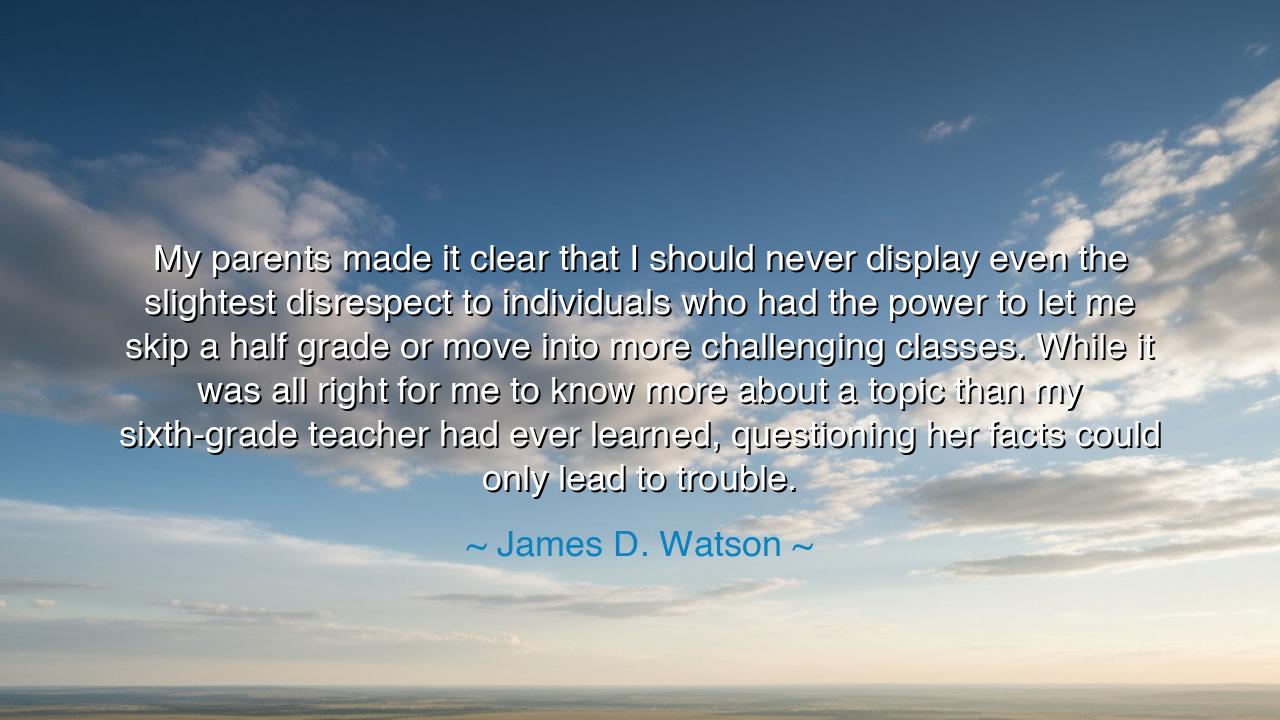
My parents made it clear that I should never display even the
My parents made it clear that I should never display even the slightest disrespect to individuals who had the power to let me skip a half grade or move into more challenging classes. While it was all right for me to know more about a topic than my sixth-grade teacher had ever learned, questioning her facts could only lead to trouble.






The scientist James D. Watson, who with Francis Crick unraveled the structure of DNA, once remembered the teachings of his youth: “My parents made it clear that I should never display even the slightest disrespect to individuals who had the power to let me skip a half grade or move into more challenging classes. While it was all right for me to know more about a topic than my sixth-grade teacher had ever learned, questioning her facts could only lead to trouble.” In this recollection, there is more than the story of a boy in school—there is the eternal lesson of humility, strategy, and the art of living within systems greater than ourselves.
The first meaning is plain: knowledge alone is not enough; one must also learn wisdom in dealing with authority. Watson’s parents saw clearly that teachers, even if imperfect, held the keys to advancement. A child might be clever enough to correct an error, but doing so in arrogance would shut doors rather than open them. Thus they instructed him in a kind of diplomacy: know when to speak, and when silence serves better. This is not cowardice, but prudence—the discipline of timing, without which even truth can become folly.
Watson admits that he often knew more than his teachers, for the hunger of his mind raced beyond their prepared lessons. Yet he also saw the danger in flaunting this knowledge. A challenge, even well-meaning, could appear as disrespect, undermining the dignity of the classroom and provoking resentment. Here is a hard truth: being right is not always enough; one must also be gracious. Knowledge must be yoked to humility, lest it harden into arrogance and provoke resistance rather than inspiration.
History has shown the power of this balance. Galileo Galilei, armed with the truth of the heavens, defied the dogmas of his age, but his boldness before authority brought him to trial and silenced his voice for years. Contrast this with Isaac Newton, who, though equally revolutionary, worked within networks of patronage and carefully shielded his more radical ideas until the time was ripe. Both men were brilliant, but one suffered because he challenged too directly, while the other advanced by combining knowledge with prudence. Watson’s parents, in their wisdom, trained their son to walk the second path.
The deeper meaning of Watson’s story lies in the tension between truth and power. Authority does not always reside in the wisest; it often rests in those who occupy positions of influence. To navigate this reality is not to betray truth, but to preserve one’s strength for the right battles. There is a time to yield for the sake of peace, and a time to challenge for the sake of justice. The young student must learn both, just as the warrior must learn when to raise the sword and when to keep it sheathed.
The lesson for us is profound: humility is a weapon as sharp as knowledge. One may know more than another, but if that knowledge is delivered with scorn, it will be rejected. If delivered with patience and respect, it may be received in time. Therefore, wisdom demands not only the pursuit of learning, but also the cultivation of character—self-control, respect, and patience with the failings of others.
Practically, this means learning to guard the tongue. When confronted with error, ask: will correction bring growth, or only resentment? Choose words that lift rather than wound, and seek always the greater goal—not the satisfaction of being right, but the building of bridges that lead to greater truth. For in life, advancement often depends not only on what we know, but on how we walk among others who hold the keys to our future.
Thus, Watson’s memory is more than a personal anecdote—it is a teaching. Respect for authority, even when flawed, can preserve opportunities that reckless pride would destroy. Knowledge may open the mind, but humility opens the way. And if we carry both, we may advance like Watson himself: moving from the restless brilliance of youth into discoveries that reshape the destiny of mankind.






AAdministratorAdministrator
Welcome, honored guests. Please leave a comment, we will respond soon